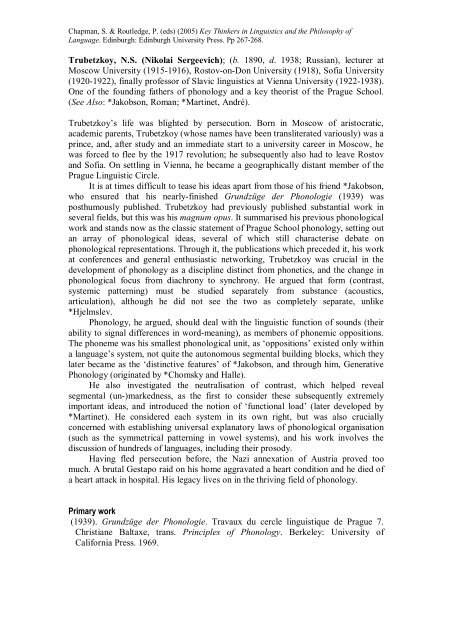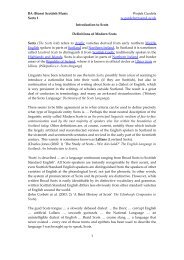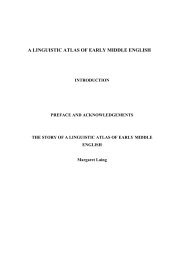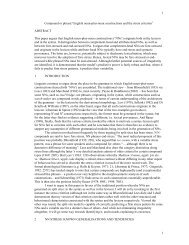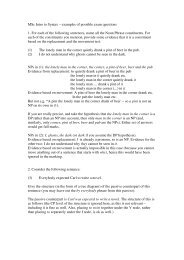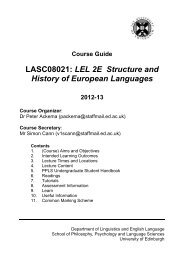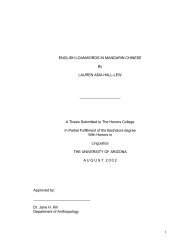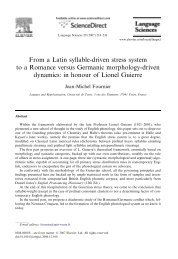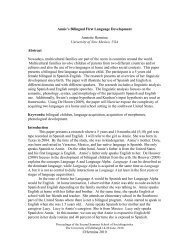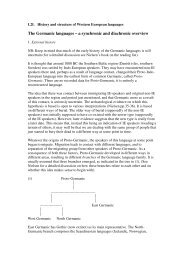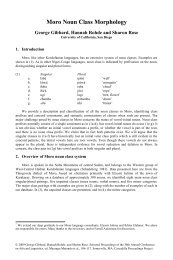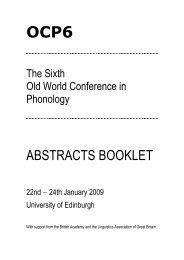Trubetzkoy, N.S. (Nikolai Sergeevich) - Linguistics and English ...
Trubetzkoy, N.S. (Nikolai Sergeevich) - Linguistics and English ...
Trubetzkoy, N.S. (Nikolai Sergeevich) - Linguistics and English ...
Create successful ePaper yourself
Turn your PDF publications into a flip-book with our unique Google optimized e-Paper software.
Chapman, S. & Routledge, P. (eds) (2005) Key Thinkers in <strong>Linguistics</strong> <strong>and</strong> the Philosophy of<br />
Language. Edinburgh: Edinburgh University Press. Pp 267-268.<br />
<strong>Trubetzkoy</strong>, N.S. (<strong>Nikolai</strong> <strong>Sergeevich</strong>); (b. 1890, d. 1938; Russian), lecturer at<br />
Moscow University (1915-1916), Rostov-on-Don University (1918), Sofia University<br />
(1920-1922), finally professor of Slavic linguistics at Vienna University (1922-1938).<br />
One of the founding fathers of phonology <strong>and</strong> a key theorist of the Prague School.<br />
(See Also: *Jakobson, Roman; *Martinet, André).<br />
<strong>Trubetzkoy</strong>’s life was blighted by persecution. Born in Moscow of aristocratic,<br />
academic parents, <strong>Trubetzkoy</strong> (whose names have been transliterated variously) was a<br />
prince, <strong>and</strong>, after study <strong>and</strong> an immediate start to a university career in Moscow, he<br />
was forced to flee by the 1917 revolution; he subsequently also had to leave Rostov<br />
<strong>and</strong> Sofia. On settling in Vienna, he became a geographically distant member of the<br />
Prague Linguistic Circle.<br />
It is at times difficult to tease his ideas apart from those of his friend *Jakobson,<br />
who ensured that his nearly-finished Grundzüge der Phonologie (1939) was<br />
posthumously published. <strong>Trubetzkoy</strong> had previously published substantial work in<br />
several fields, but this was his magnum opus. It summarised his previous phonological<br />
work <strong>and</strong> st<strong>and</strong>s now as the classic statement of Prague School phonology, setting out<br />
an array of phonological ideas, several of which still characterise debate on<br />
phonological representations. Through it, the publications which preceded it, his work<br />
at conferences <strong>and</strong> general enthusiastic networking, <strong>Trubetzkoy</strong> was crucial in the<br />
development of phonology as a discipline distinct from phonetics, <strong>and</strong> the change in<br />
phonological focus from diachrony to synchrony. He argued that form (contrast,<br />
systemic patterning) must be studied separately from substance (acoustics,<br />
articulation), although he did not see the two as completely separate, unlike<br />
*Hjelmslev.<br />
Phonology, he argued, should deal with the linguistic function of sounds (their<br />
ability to signal differences in word-meaning), as members of phonemic oppositions.<br />
The phoneme was his smallest phonological unit, as ‘oppositions’ existed only within<br />
a language’s system, not quite the autonomous segmental building blocks, which they<br />
later became as the ‘distinctive features’ of *Jakobson, <strong>and</strong> through him, Generative<br />
Phonology (originated by *Chomsky <strong>and</strong> Halle).<br />
He also investigated the neutralisation of contrast, which helped reveal<br />
segmental (un-)markedness, as the first to consider these subsequently extremely<br />
important ideas, <strong>and</strong> introduced the notion of ‘functional load’ (later developed by<br />
*Martinet). He considered each system in its own right, but was also crucially<br />
concerned with establishing universal explanatory laws of phonological organisation<br />
(such as the symmetrical patterning in vowel systems), <strong>and</strong> his work involves the<br />
discussion of hundreds of languages, including their prosody.<br />
Having fled persecution before, the Nazi annexation of Austria proved too<br />
much. A brutal Gestapo raid on his home aggravated a heart condition <strong>and</strong> he died of<br />
a heart attack in hospital. His legacy lives on in the thriving field of phonology.<br />
Primary work<br />
(1939). Grundzüge der Phonologie. Travaux du cercle linguistique de Prague 7.<br />
Christiane Baltaxe, trans. Principles of Phonology. Berkeley: University of<br />
California Press. 1969.
Chapman, S. & Routledge, P. (eds) (2005) Key Thinkers in <strong>Linguistics</strong> <strong>and</strong> the Philosophy of<br />
Language. Edinburgh: Edinburgh University Press. Pp 267-268.<br />
Further reading<br />
Anderson, Stephen (1985). Phonology in the Twentieth Century. Chicago: University<br />
of Chicago Press.<br />
Jakobson, Roman (1939). ‘Nécrologie Nikolaj Sergejevič <strong>Trubetzkoy</strong>’. Acta<br />
Linguistica 1. Reprinted in Thomas Sebeok (ed.) (1966). Portraits of Linguists.<br />
Bloomington: Indiana University Press, 526-542.<br />
Jakobson, Roman (ed.) (1958). ‘Autobiographical notes on N.S. <strong>Trubetzkoy</strong>’.<br />
Appendix to second edition of <strong>Trubetzkoy</strong>’s Grundzüge; also in Baltaxe’s (1969)<br />
translation.<br />
Patrick Honeybone<br />
<strong>Linguistics</strong> <strong>and</strong> <strong>English</strong> Language, School of Philosophy, Psychology <strong>and</strong> Language Sciences<br />
University of Edinburgh<br />
patrick.honeybone@ed.ac.uk<br />
NB: The (See Also’s) at the start, <strong>and</strong> asterisked names in the text refer only to other linguists who<br />
feature in Key Thinkers in <strong>Linguistics</strong> <strong>and</strong> the Philosophy of Language. It’s a good book – buy it!<br />
Further further reading <strong>and</strong> notes<br />
(Titles <strong>and</strong> things which I could not include in the published version due to constraints on space: 500 words in total...)<br />
• Much has been written about <strong>Trubetzkoy</strong> <strong>and</strong> Prague School phonology. Some interesting pieces are:<br />
Halle, Morris (1987). ‘Remarks on the Scientific Revolution in <strong>Linguistics</strong> 1926-1929’. In<br />
Krystyna Pomorska et al. (eds) Language, Poetry <strong>and</strong> Poetics. Berlin: Mouton de Gruyter.<br />
Fischer-Jørgensen, Eli (1975). Trends in Phonological Theory. Copenhagen: Academisk Forlag.<br />
Jakobson, Roman et al. (eds.) (1975). N.S. <strong>Trubetzkoy</strong>’s Letters <strong>and</strong> Notes. The Hague: Mouton.<br />
Simpson, J.M.Y. (1995) ‘Prague School Phonology’. In E.F.K. Koerner <strong>and</strong> R.E. Asher (eds.)<br />
Concise History of the Language Sciences. Oxford: Elsevier.<br />
• <strong>Trubetzkoy</strong> was a true internationalist, <strong>and</strong> had contact with most of the other well known thinkers<br />
in phonology of the period, including Sapir, Hjemslev, Jones <strong>and</strong> Firth. He corresponded widely<br />
<strong>and</strong> was a serious organiser, aiming to work with those who agreed with him that a truly<br />
‘phonological’ approach was necessary. He worked to set up an ‘International Phonology<br />
Association’.<br />
• He published a number of articles on phonological issues while at Vienna (in Russian, French <strong>and</strong><br />
German), many in the TCLP; most of the key points in them were incorporated into Grundzüge<br />
der Phonologie.


